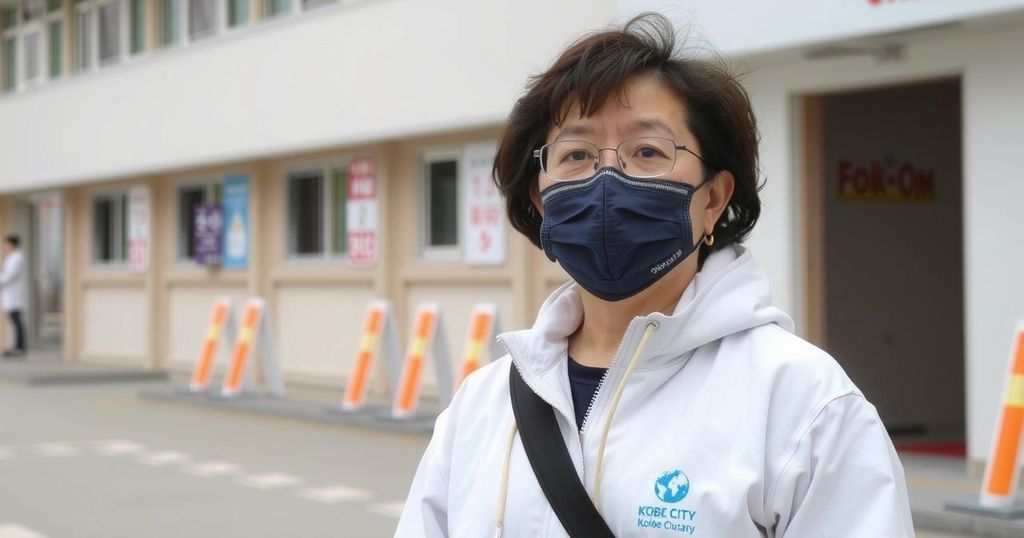Kobe Employee Aims to Strengthen Disaster Preparedness After Noto Earthquake

Masayuki Fujisawa, a Kobe City employee, is dedicated to enhancing disaster preparedness in his hometown after serving in the Noto Peninsula following last year’s earthquake. His commitment stems from personal experiences with the Great Hanshin Earthquake, and he aims to convey the importance of readiness through his work, highlighting the ongoing challenges faced by communities in recovery efforts.
In a moving testament to community spirit and disaster preparedness, a municipal employee from Kobe, Masayuki Fujisawa, has committed himself to imparting crucial lessons learned during his year of service in the Noto Peninsula, following the devastating earthquake that struck the region on New Year’s Day last year. Having been dispatched from Kobe to the heavily impacted Suzu City, the 30-year-old has vowed to channel his experiences to ensure that residents of Kobe maintain a heightened awareness of disaster readiness.
Having grown up hearing poignant accounts of the catastrophic Great Hanshin Earthquake in 1995, which struck just before his birth, Fujisawa has a personal connection to the impacts of such disasters. Initially working in the private sector, he returned to public service with a desire to contribute to his hometown of Kobe, believing in the importance of preparedness through informed community engagement.
Fujisawa was profoundly impacted by the extensive devastation he encountered in Noto, where approximately 3,800 structures suffered severe damage. His experiences were further compounded by a significant aftershock, an event that ignited a deeper appreciation for his stable life in Kobe. “How grateful I am to be able to live a normal life in Kobe,” he reflected on this crucial moment.
Fujisawa serves as a public relations officer for Suzu City, working diligently to facilitate communication and support for disaster victims, including contributing to local cable television programming. His efforts culminated in delivering critical newsletters to temporary housing facilities, marking a significant step in supporting those affected. As he reflects on these experiences during his 30th birthday, he emphasizes his mission: “Even though people know that preparedness is important, few are able to get ready with a concrete image in mind. I want to earnestly convey how frightening these disasters are.”
Amidst the widespread aftermath of disasters in Japan, Fujisawa’s resolve exemplifies the essential contributions made by support workers. As he prepares to return to Kobe, he intends to apply his insights to enhance public awareness about disaster preparedness and encourage proactive approaches within his community.
His commitment is echoed in the broader context of recovery, highlighting the necessity of support personnel during such calamities. As of early December, 566 support workers were active in the region, underscoring the pressing demand for assistance in recovery and reconstruction efforts as local governments continue to grapple with the ramifications of the earthquake.
Fujisawa’s work signifies not just a personal response to disaster recovery but also serves as a critical reminder of the ongoing need for preparedness strategies and community resilience in the face of inevitable natural disasters.
The article discusses the profound impact of the Noto Peninsula Earthquake on local communities and the subsequent need for disaster preparedness. Specifically, it follows Masayuki Fujisawa, a Kobe City employee, as he transitions from personal experience of the Great Hanshin Earthquake to actively participating in recovery efforts in Noto. His year-long commitment as a support worker illustrates the significance of applying firsthand insights into disaster management and community engagement. The backdrop of worker shortages following significant disasters highlights the ongoing challenges that municipalities face in recovery processes and the crucial role that dispatched workers play in addressing these challenges.
In conclusion, Masayuki Fujisawa’s experiences in the Noto Peninsula following last year’s earthquake underscore the necessity for enhanced disaster preparedness and community awareness. His dedication to sharing these vital lessons with his hometown of Kobe serves as an important reminder of the enduring impacts of natural disasters and the essential role that support workers fulfill in facilitating recovery efforts. This narrative not only highlights Fujisawa’s personal journey but also evokes a broader call for proactive engagement within communities to better prepare for future calamities.
Original Source: japannews.yomiuri.co.jp








